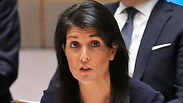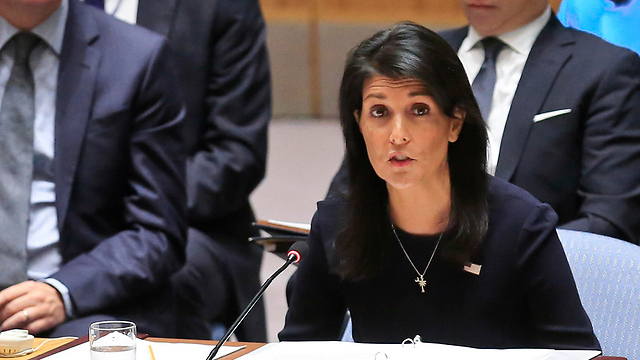
Nikki Haley
Photo: Reuters

Haley lays out argument to say Iran not abiding by nuclear deal
Speaking to a conservative think tank, President Trump's UN ambassador details information which may lead to US declaring Tehran to be in breach of the nuclear deal, says Trump may have to ‘move beyond narrow technicalities and look at the big picture.'
President Donald Trump's envoy to the United Nations laid out an argument Tuesday for the US to potentially declare Iran in violation of the nuclear deal, but suggested the Trump administration might then leave it to Congress to decide whether to withdraw.
In a speech to a conservative think tank, US Ambassador Nikki Haley said she didn't know what decision Trump would ultimately make, as a series of deadlines approach. But she said if he did decide against certifying Iran's compliance, he'd be on solid ground, but added, "What happens next is significantly in Congress' hands."
"I get that Congress doesn't want this. This is not an easy situation for Congress," Haley said. "But our lives are not about being easy. Our lives are about being right."
The Trump administration has been debating for months whether to scuttle the nuclear deal, as Trump threatened to do as a candidate, despite staunch opposition from US allies who negotiated the deal with former President Barack Obama's administration. Under pressure from both sides, the administration has been exploring possible halfway options, such as declaring Iran in violation but leaving its relief from nuclear sanctions in place at least temporarily.
Yet while a US law passed to codify the nuclear deal gives lawmakers some oversight, the agreement is not a treaty. It's been widely assumed until now that responsibility lies with the White House, not Congress, to determine continued US participation in the deal.
Kicking the issue to Congress would also echo the president's newly announced approach on immigration and another Obama-era program that shielded from deportation some immigrants brought to the US illegally as children. Trump's administration announced Tuesday the program "was being rescinded," but Congress would have six months to try to come up with a legislative fix.
Under the nuclear deal and the related US law, the president must tell Congress every 90 days whether Tehran is complying with its obligations under the deal, in which Iran agreed to roll back its nuclear program in exchange for billions of dollars in sanctions relief. The International Atomic Energy Agency, the UN agency that monitors the deal, said as recently as last week that Iran was complying.
The Trump administration has faced two of the 90-day deadlines so far, and both times avoided the showdown and said Iran was meeting the conditions needed to keep enjoying sanctions relief. But Trump more recently has said he does not expect to certify Iran's compliance again. The next deadline is in mid-October.
Questioned about the approach during a speech at the American Enterprise Institute, Haley insisted she wasn't preordaining what should or shouldn't happen. She also acknowledged that US allies in Europe are pushing Washington to stay in the painstakingly negotiated deal, but added: "This is about US national security. This is not about European security."
"If the president finds that he cannot in good faith certify Iranian compliance, he would initiate a process whereby we move beyond narrow technicalities and look at the big picture," Haley said.

















